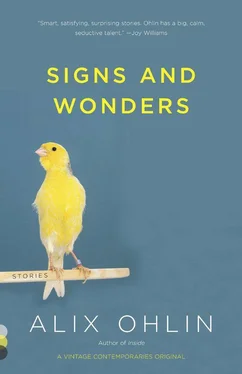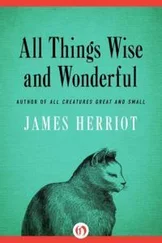Alix Ohlin - Signs and Wonders
Здесь есть возможность читать онлайн «Alix Ohlin - Signs and Wonders» весь текст электронной книги совершенно бесплатно (целиком полную версию без сокращений). В некоторых случаях можно слушать аудио, скачать через торрент в формате fb2 и присутствует краткое содержание. Год выпуска: 2012, ISBN: 2012, Издательство: Random House, Inc., Жанр: Современная проза, на английском языке. Описание произведения, (предисловие) а так же отзывы посетителей доступны на портале библиотеки ЛибКат.
- Название:Signs and Wonders
- Автор:
- Издательство:Random House, Inc.
- Жанр:
- Год:2012
- ISBN:9780307948649
- Рейтинг книги:3 / 5. Голосов: 1
-
Избранное:Добавить в избранное
- Отзывы:
-
Ваша оценка:
- 60
- 1
- 2
- 3
- 4
- 5
Signs and Wonders: краткое содержание, описание и аннотация
Предлагаем к чтению аннотацию, описание, краткое содержание или предисловие (зависит от того, что написал сам автор книги «Signs and Wonders»). Если вы не нашли необходимую информацию о книге — напишите в комментариях, мы постараемся отыскать её.
Signs and Wonders — читать онлайн бесплатно полную книгу (весь текст) целиком
Ниже представлен текст книги, разбитый по страницам. Система сохранения места последней прочитанной страницы, позволяет с удобством читать онлайн бесплатно книгу «Signs and Wonders», без необходимости каждый раз заново искать на чём Вы остановились. Поставьте закладку, и сможете в любой момент перейти на страницу, на которой закончили чтение.
Интервал:
Закладка:
“Maybe he was a liar,” Fowler said, as she’d known he would, and she smiled.
“Do you want to move in?” she asked him.
Fowler said, “Oh. Oh.”
“It’s okay if you don’t want to,” she said. “It’s just that you spend so much time here already.”
“Right. True.”
“It would save you some back-and-forth,” she said. “It’s a matter of convenience, really.”
Fowler looked deep into her eyes, into her soul, as was his wont. “Well, let’s not do it out of convenience, ” he said.
She blushed. “I mean, I like having you here. I’d like to have you here more often.” He drew these statements from her, from a well she’d thought had long ago run dry.
“I snore, you know,” Fowler said.
“I’m past minding,” she said.
She went to his place to help him pack up. She’d only been there once before, after a party where she’d gotten a bit drunk, and her impression had been of a scholarly hobbit-hole, cozy and knowledge filled. In a sober light this turned out to be overly positive. It was a studio apartment with books along one wall, floor to ceiling, and what she’d thought were bookshelves were boards and cement blocks. There was a bed and, in one corner, primitive instruments, gourds and sticks of wood. Fowler went to the closet, got out a suitcase, and packed his clothes. He owned two pairs of jeans, three white shirts, a sweater vest, and a blazer. This was his wardrobe in its entirety. Once he was done he closed the suitcase and looked around.
“I might as well just leave the rest of it,” he said. “I’ll probably wind up coming back here to work.”
Although she considered Fowler a scholar, a person who lived in the mind, Beth didn’t exactly think of him as someone who worked. What he did was less like a job and more like an atmosphere he moved in, a thick clear jelly that surrounded him and in which he was suspended, like aspic. Her ex-husband, after hearing about Fowler from the children, had called her up and said, “Just who is this guy? What does he do?” Fowler’s not a person who does , Beth wanted to say. Instead she said, “He thinks.” Her ex sighed and asked her to put the children on.
But now she had the same question. “What kind of work, exactly?” she said.
“I’m writing a book,” Fowler said, looking at her with the same expression with which he’d told the lie at the party: a little sheepish, his eyebrows and shoulders raised, as if he expected to be found out. But she didn’t care if he was lying, or if he wrote a book or not. She opened the door for him, and he picked up the suitcase and led her out.
They developed a routine. During the day Fowler went back to his hovel, and Beth went to work. She was an office manager, and all day long she coordinated appointments and ordered supplies; then, at home, she coordinated her children’s appointments and bought groceries. Management was her specialty. When work was over Beth made dinner and Fowler either read or spent time with the children, if they were there. Their favorite story was about a turtle who steals a calabash from the gods that contains all the wisdom in the world. He hangs it around his neck and hurries home. But then he comes to a tree trunk lying across the road, and he can’t cross it because the calabash gets in his way. For some reason — stress, excitement, lack of time — he forgets that he can put it on his back, and instead he gets so frustrated that he smashes it. And ever since that day, Fowler told the children, wisdom has been scattered all over the world in tiny pieces. Beth couldn’t understand why her children liked this defeatist story, though Fowler did a great imitation of the turtle smashing the calabash into a million pieces. Later she discovered they had no idea what a calabash was. They thought it was a little animal, and the ending a killing scene. They were bloodthirsty in their misunderstanding, but she didn’t want to correct them, because they enjoyed it so much.
Fowler said he had to go to a conference and discuss his work with other ethnomusicologists. Beth bought him the ticket and sent him on his way. What she hadn’t realized was how much she’d miss him. The children moped too. The days were long, the nights longer. The world felt empty. One afternoon she left the office early and went to Fowler’s apartment, her excuse — not that anyone was asking — being that she ought to take in the mail. The room was dusty and the gourds were thick with grime. She thought maybe she could clean them for him, so she took an abandoned T-shirt and began wiping them off. The gourds varied in size and shape, from large and round to long and phallic. Touching these last ones reminded her of Fowler in bed, and she missed him more than ever.
She picked a gourd up and fondled it, and while putting it back she dropped it on the floor. Fortunately it was sturdy and didn’t break. But it could have, and she knew she was crazy if she thought Fowler would appreciate any cleaning she did. He didn’t care about cleanliness any more than the other mundane details of the world. Quickly, as if he were coming home at any second, she returned everything to its original place and left.
When Fowler came back he knew at once what she’d done. He was sensitive to any change in his environment, any object out of place. He came over to the house late at night and said, “You were in my apartment.”
“Yes,” she said. “I wanted to do something nice for you.”
He didn’t believe her. He thought she was there to check up on him, to prove he was not in fact writing his book. Convinced that she didn’t trust in him or his work, he ran to the bathroom and threw up. Beth followed and talked to him through the door. She couldn’t understand getting so upset over something so minor, but this was Fowler all over, almost too sensitive for the world.
“It was just because I missed you,” she said.
“You want me to be something I’m not.”
“I want you to be here, with me.”
“I’m not conventional, Beth. My work is abstract. I’m not the man in the gray flannel suit.”
“But I don’t care,” Beth said.
“Everybody cares,” Fowler said. She could picture him crouched on the tile floor, his long thin limbs curling and twitching like an insect’s. “They don’t see how much of it is here, inside my head. How much real work is going on. Everybody thinks I’m lying about the book, that just because I occasionally tell stories I can’t also be truthful. ” When upset he was prone to italics. “But the book is real and truthful. It’s the most real and truthful thing about me. Maybe the only thing.” He was moaning, kind of.
“I was just cleaning,” Beth said.
“Everyone wants to see results. They want objects, ” Fowler said. “They don’t measure the quality of ideas. ”
She saw that she’d hit a nerve and there was no hope of unhitting it. She also saw that explaining she had no investment in the quality of ideas wouldn’t help. But she thought that maybe she could distract and soothe him alternately.
“I’m happy you’re back,” she said, putting her hand on the door, trying to put sex in her voice. But Fowler wouldn’t budge.
He stayed in the bathroom until she went to bed, and then he went back to his place.
In one of Fowler’s stories — not that they were his, but that’s how she nonetheless thought of them — a mosquito falls in love with an ear. Why an ear? The story doesn’t explain. The mosquito doesn’t consider the union’s prospects unlikely. It has an idea about the ear and will not be denied the rewards of that idea. It doesn’t understand why the ear won’t reciprocate its affection and only when repeatedly, permanently rebuffed does it start to bite.
Читать дальшеИнтервал:
Закладка:
Похожие книги на «Signs and Wonders»
Представляем Вашему вниманию похожие книги на «Signs and Wonders» списком для выбора. Мы отобрали схожую по названию и смыслу литературу в надежде предоставить читателям больше вариантов отыскать новые, интересные, ещё непрочитанные произведения.
Обсуждение, отзывы о книге «Signs and Wonders» и просто собственные мнения читателей. Оставьте ваши комментарии, напишите, что Вы думаете о произведении, его смысле или главных героях. Укажите что конкретно понравилось, а что нет, и почему Вы так считаете.












